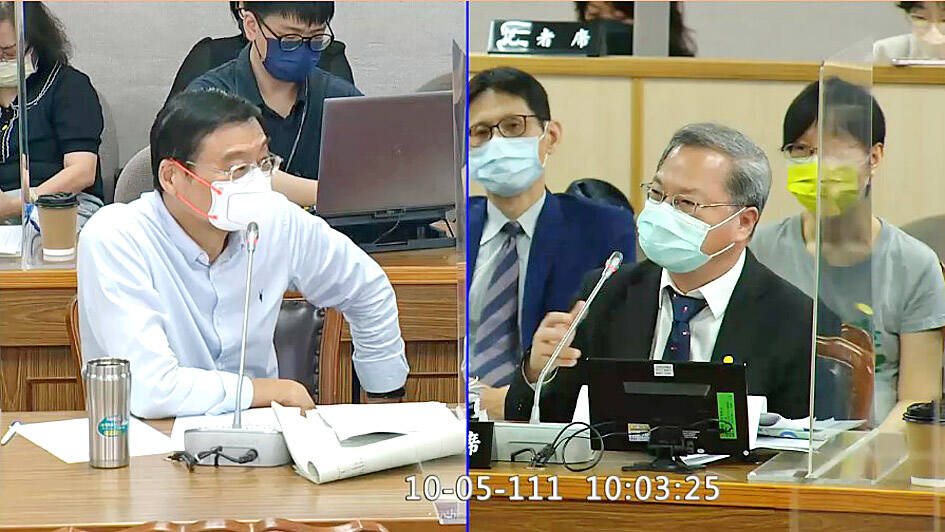The government would trim its GDP growth forecast of 3.76 percent for this year if exports disappoint, but the reading would stay above the 3 percent mark, National Development Council Minister Kung Ming-hsin (龔明鑫) told lawmakers yesterday.
Kung made the remarks as lawmakers raised concerns over the economy, inflation and monetary policy.
The Directorate-General of Budget, Accounting and Statistics, which in August cut its growth forecast for this year to 3.76 percent, could revise it down again next month if exports fare weaker than expected, Kung said.

Photo: Screen grab from the Legislative Yuan television channel
Exports, the mainstay of Taiwan’s small and open economy, likely had slipped into contraction mode last month after squeezing a mild 2 percent gain in August, the Ministry of Finance has said.
Shipments of tech products slowed drastically in August, while those of non-tech products dipped into negative territory. The government is to release last month’s trade data tomorrow.
Kung voiced confidence that GDP growth would exceed 3 percent this year, but expressed reservations when asked if it would be larger than 3.5 percent.
Growth in the consumer price index for last month is forecast to remain above 2 percent, but is likely to be weaker than August’s growth of 2.66 percent due to a drop in international oil prices, he said.
However, it would be difficult for world energy prices to slump given lingering supply issues, Kung said, adding that while oil prices have sagged, natural gas prices remain high amid the war in Ukraine.
Central banks in advanced nations would reconsider the wisdom of drastic tightening to curb inflation after the UN on Monday warned that the monetary policies of wealthy nations could spark a global economic downturn, Kung said.
Lawmakers from across party lines expressed unease that capital flight would persist, and hurt the local currency and share prices given Taiwan’s widening interest rate gap with major economies.
The global economy would slow from a forecast 2.5 percent growth this year to 2.2 percent next year, a slowdown that would leave global GDP well below its pre-COVID-19 pandemic norm and cost the world economy about US$17 trillion, or 20 percent of the world income, if major central banks press ahead with steep rate hikes, the UN said.
Foreign funds would shift their focus back to economic fundamentals and value local shares again after making moves to reflect global monetary tightening, Kung said.
The minister voiced reservations about suggestions to distribute tax surpluses to stimulate private consumption, saying that the public would most likely save instead of spend the money.

‘SWASTICAR’: Tesla CEO Elon Musk’s close association with Donald Trump has prompted opponents to brand him a ‘Nazi’ and resulted in a dramatic drop in sales Demonstrators descended on Tesla Inc dealerships across the US, and in Europe and Canada on Saturday to protest company chief Elon Musk, who has amassed extraordinary power as a top adviser to US President Donald Trump. Waving signs with messages such as “Musk is stealing our money” and “Reclaim our country,” the protests largely took place peacefully following fiery episodes of vandalism on Tesla vehicles, dealerships and other facilities in recent weeks that US officials have denounced as terrorism. Hundreds rallied on Saturday outside the Tesla dealership in Manhattan. Some blasted Musk, the world’s richest man, while others demanded the shuttering of his

ADVERSARIES: The new list includes 11 entities in China and one in Taiwan, which is a local branch of Chinese cloud computing firm Inspur Group The US added dozens of entities to a trade blacklist on Tuesday, the US Department of Commerce said, in part to disrupt Beijing’s artificial intelligence (AI) and advanced computing capabilities. The action affects 80 entities from countries including China, the United Arab Emirates and Iran, with the commerce department citing their “activities contrary to US national security and foreign policy.” Those added to the “entity list” are restricted from obtaining US items and technologies without government authorization. “We will not allow adversaries to exploit American technology to bolster their own militaries and threaten American lives,” US Secretary of Commerce Howard Lutnick said. The entities

Minister of Finance Chuang Tsui-yun (莊翠雲) yesterday told lawmakers that she “would not speculate,” but a “response plan” has been prepared in case Taiwan is targeted by US President Donald Trump’s reciprocal tariffs, which are to be announced on Wednesday next week. The Trump administration, including US Secretary of the Treasury Scott Bessent, has said that much of the proposed reciprocal tariffs would focus on the 15 countries that have the highest trade surpluses with the US. Bessent has referred to those countries as the “dirty 15,” but has not named them. Last year, Taiwan’s US$73.9 billion trade surplus with the US

Prices of gasoline and diesel products at domestic gas stations are to fall NT$0.2 and NT$0.1 per liter respectively this week, even though international crude oil prices rose last week, CPC Corp, Taiwan (台灣中油) and Formosa Petrochemical Corp (台塑石化) said yesterday. International crude oil prices continued rising last week, as the US Energy Information Administration reported a larger-than-expected drop in US commercial crude oil inventories, CPC said in a statement. Based on the company’s floating oil price formula, the cost of crude oil rose 2.38 percent last week from a week earlier, it said. News that US President Donald Trump plans a “secondary